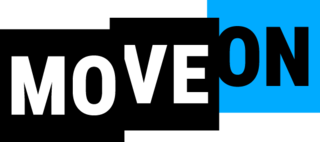Related Research Articles

MoveOn is a progressive public policy advocacy group and political action committee. Formed in 1998 around one of the first massively viral email petitions, MoveOn has since grown into one of the largest grassroots progressive campaigning communities in the United States, with a membership of millions. MoveOn did not endorse a candidate during the 2020 presidential primary campaign; it then endorsed and actively supported Joe Biden in the general election. Rahna Epting became Executive Director of both MoveOn Civic Action and MoveOn Political Action in 2019.
Microtargeting is the use of online data to tailor advertising messages to individuals, based on the identification of recipients’ personal vulnerabilities. Such tactics can be used for promoting a product or a political candidate. Direct marketing datamining techniques that are used often involve predictive market segmentation. Microtargeting's tactics rely on transmitting a tailored message to a subgroup on the basis of unique information about that subgroup.
Tatango is an U.S. mobile marketing company that specializes in text message marketing (SMS/MMS) services.
Vote.org, formerly Long Distance Voter, is a nonpartisan 501(c)(3) non-profit organization that is based in the United States. It provides online voter guides for every state, including voter registration forms, absentee ballot applications, and information on deadlines, directions, and ID and residency requirements.
NGP VAN, Inc. is an American privately owned voter database and web hosting service provider used by the Democratic Party, Democratic campaigns, and other non-profit organizations authorized by the Democratic Party. The platform or service is used by political and social campaigns for fundraising, campaign finance compliance, field organizing, and digital organizing. NGP VAN, Inc. was formerly known as Voter Activation Network, Inc. and changed its name to NGP VAN, Inc. in January 2011. The company was founded in 2001 and is based in Washington, D.C., with an additional location in Somerville, Massachusetts.
Social media and political communication in the United States refers to how political institutions, politicians, private entities, and the general public use social media platforms to communicate and interact in the United States.

Cambridge Analytica Ltd (CA), previously known as SCL USA, was a British political consulting firm that came to prominence through the Facebook–Cambridge Analytica data scandal. It was started in 2013, as a subsidiary of the private intelligence company and self-described "global election management agency" SCL Group by long-time SCL executives Nigel Oakes, Alexander Nix and Alexander Oakes, with Nix as CEO. The well-connected founders had contact with, among others, the British Conservative Party, royal family, and military. The firm maintained offices in London, New York City, and Washington, D.C. The company closed operations in 2018 in the course of the Facebook–Cambridge Analytica data scandal, although firms related to both Cambridge Analytica and its parent firm SCL still exist.
Social media played an important role in shaping the course of events leading up to, during, and after the 2016 United States presidential election. It enabled people to have a greater interaction with the political climate, controversies, and news surrounding the candidates. Unlike traditional news platforms, such as newspapers, radio, and magazines, social media gave people the ability to comment below a candidate's advertisement, news surrounding the candidates, or articles regarding the policy of the candidates. It also allowed people to formulate their own opinions on public forums and sites and allowed for greater interaction among voters. The accessibility of information online enabled more voters to educate themselves on candidates' positions on issues, which in turn enabled them to form unique opinions on candidates and vote on those opinions, ultimately impacting the election's outcome.

Brad Parscale is an American digital consultant and political advisor who served as the senior adviser for data and digital operations for Donald Trump's 2020 presidential campaign. He previously served as the digital media director for Donald Trump's 2016 presidential campaign and as campaign manager for Donald Trump's 2020 presidential campaign from February 2018 to July 2020, being replaced by Bill Stepien. In September 2020, he stepped away from his company and the Trump campaign.
Crowdpac is a for-profit website founded in 2014, with the purpose of helping unknown Democratic political outsiders raise money and run for office, and to track political data from across the United States. While it was originally marketed as a non-partisan political fundraising site, the platform is currently only open for fundraising to select political ideologies.
"Project Alamo" was a database of voter information created for Donald Trump's 2016 presidential campaign and an associated fundraising and political advertising operation on social media platforms. It was organized by the Giles-Parscale firm in San Antonio, Texas. The campaign paid Giles-Parscale as much as $94 million for fundraising, political advertising, and digital media services, including the creation of Trump's web site. A new database of voter information named "Project Alamo" was at the heart of Giles-Parscale's efforts, allowing highly targeted advertising on social media platforms. The advertising campaigns added to the database over time, driving more effective targeting. The scale of the fundraising and political advertising campaigns on social media was massive, with hundreds of thousands of targeted ads being delivered daily. Project Alamo has been credited as an important factor in Trump's 2016 victory.
Hustle is an American company that provides a peer-to-peer text messaging platform for areas such as politics, higher education, and non-profits. The platform initiates personal conversation between organizations and their targeted supporters or clients. Hustle was founded in December 2014, by Perry Rosenstein, Roddy Lindsay, and Tyler Brock.
Social media use in politics refers to the use of online social media platforms in political processes and activities. Political processes and activities include all activities that pertain to the governance of a country or area. This includes political organization, global politics, political corruption, political parties, and political values.
Social media was used extensively in the 2020 United States presidential election. Both incumbent president Donald Trump and Democratic Party nominee Joe Biden's campaigns employed digital-first advertising strategies, prioritizing digital advertising over print advertising in the wake of the pandemic. Trump had previously utilized his Twitter account to reach his voters and make announcements, both during and after the 2016 election. The Democratic Party nominee Joe Biden also made use of social media networks to express his views and opinions on important events such as the Trump administration's response to the COVID-19 pandemic, the protests following the murder of George Floyd, and the controversial appointment of Amy Coney Barrett to the Supreme Court.
BlueLink is a suite of campaign management mobile apps designed to register, organize, and mobilize liberal voters. The suite was formerly known as Shadow, operated by Shadow Inc., before the latter sold it to Acronym, who in turn sold BlueLink to Civitech PBC. The company gained attention after their IowaReporterApp software failed during the 2020 Iowa Democratic caucuses.
Acronym is a Washington, D.C.-based American 501(c)(4) non-profit corporation, co-founded by Tara McGowan and Michael Dubin in 2017. The organization is one of the major coordinators and producers of digital media campaigns aligned with the Democratic Party, and has been hired by or has provided support to various other organizations including the Democratic Congressional Campaign Committee, Emily's List, Everytown for Gun Safety, and Planned Parenthood. It was the majority owner of Shadow, Inc., a technology company that made the mobile application software that malfunctioned during vote tallying at the 2020 Iowa Democratic caucuses, but later divested its stake in the company.
GetThru, formerly Relay, is an American company that provides a peer-to-peer political text messaging platform.

RumbleUp is an American company that provides a peer-to-peer text messaging platform for non-profits, political organizations, and public safety announcements. The platform initiates personal conversation between the staff, supporters or designated representatives of organizations and their targeted supporters or clients. It was founded in December 2017 by Thomas Peters.
WinRed is an American Republican Party (GOP) fundraising platform endorsed by the Republican National Committee. It was launched to compete with the Democratic Party's success in online grassroots fundraising with their platform ActBlue.

The Growth & Opportunity Project, commonly called the RNC autopsy, was a 2013 report created by the Republican National Committee (RNC) following incumbent Democratic President Barack Obama's victory over Republican candidate Mitt Romney in the 2012 United States presidential election. The report proposed reasons for the Republican Party lack of success in recent elections as well as recommendations for future campaigns and the direction of the party.
References
- ↑ O'Keefe, Patrick (28 August 2018). "How P2P Texting is Revolutionizing Politics". Medium. Retrieved 16 February 2020.
Opn Sesame is the app backed by more heavy hitters in Republican politics. Gary Coby, the Director of Digital Advertising and Fundraising for President Trump in 2016 and Gerrit Lansing, the former Chief Digital Officer at the RNC and Chief Digital Officer at the White House, founded the app in many ways as "the Hustle of the right."
- 1 2 "Text campaigns are changing American politics — and nobody's ready - VICE". vice. Retrieved 16 February 2020.
Trump's re-election campaign is furiously attempting to collect as many cell phone numbers as possible from their supporters in preparation for a massive direct-to-consumer text messaging operation. "In 2016 we used text like no one had seen before on the president's campaign," said Gary Coby, co-founder of Opn Sesame and the director of digital advertising and fundraising for Trump in 2016. "You won't catch us sleeping on text in 2020. We know everyone reads their texts."
- ↑ "US midterm candidates blitz reluctant voters with texts". ft.com. 5 November 2018. Archived from the original on 5 November 2018. Retrieved 16 February 2020.
- ↑ Glazer, Sarah Krouse and Emily (2020-10-27). "Who Is Policing Political Texts in the Final Days of Election? Wireless Companies Are Trying". Wall Street Journal. ISSN 0099-9660 . Retrieved 2021-01-29.
- ↑ "Incendiary texts traced to outfit run by top Trump aide"